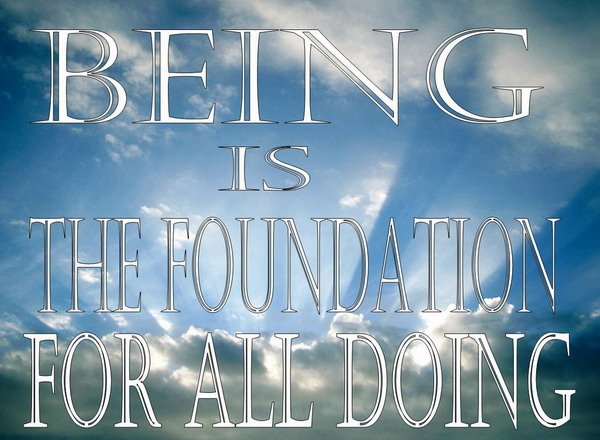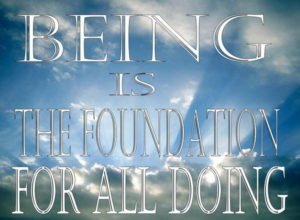To Be or Not To Be


 Being is the Foundation of All Doing
Being is the Foundation of All Doing
‘To be, or not to be, that is the question’ posed by William Shakespeare in his stage play ‘Hamlet’ which argues about the pros and cons of standing up for one’s rights. Yet this question ‘to be, or not to be’ to my mind (and the minds of countless others) is more about how we see ourselves and our use of language.
In recent years the American form of greeting ‘how are you doing’ has become increasingly common and this reflects a major shift in human perception. Let’s remember that to be is to be involved, to be active, to be interested which implies applying active intelligence and engaging with life whereas doing is simply about doing stuff with or without reason or passing time.
Now we call ourselves as human beings and the whole idea of ‘being’ is about having choice which requires an active intelligence. An active intelligence seeks out the right information regarding the nature of our existence within the universe, therefore a true intelligence involved with being comes to appreciate a sense of Dharma.
Doing on the other hand doesn’t necessarily require any intelligence and masses of people are employed doing all sorts of menial and mindless tasks as many of us find ourselves doing our chores (and all sorts of doing) for some form of reward which may be appreciation by self and others or some form of remuneration.
When many people arrive at the office and start doing their work, they often wish they were somewhere else and sometimes the worker prone to daydreaming is made to suffer. Therefore we can associate the concept of doing as a state of slavery which helps develop and maintain the structure of modern civilisation and are not necessarily in accord with Dharma.
Now being on the other hand is a much more exciting prospect whereby the first two letters ‘be’ imply an invitation to being as in be happy, be kind and be generous from which one enters the state of being happy, being kind and being generous all of which incorporate and are made far more rewarding by incorporating elements of Dharma.
“Doing mode involves thinking about the present, the future, and the past, relating to each through a veil of concepts. Being mode, on the other hand, is characterized by direct, immediate, intimate experience of the present. The being mode involves a shift in our relation to thoughts and feelings.” Mindful.org
So whatever you happen to be doing, it may be challenging but it will be beneficial if you become more aware and more involved. As human beings, happiness, joyfulness, blissfulness and ecstasy are all natural states of our being and it is through these states that we become more creative and more able to harmonise with all other life forms that all of humanity may return to a state of Sanatana Dharma.
If you are tired of participating in life as ‘just another cog’ in the machine, reflect or meditate and decide what is important to you. Stop beating yourself up over past mistakes, honor your strengths and be happy regardless of your situation. Open your heart and become the doing of what needs to be done.
DISCLAIMER: The author is solely responsible for the views expressed in this article. The author carries the responsibility for citing and/or licensing of images utilized within the text.
